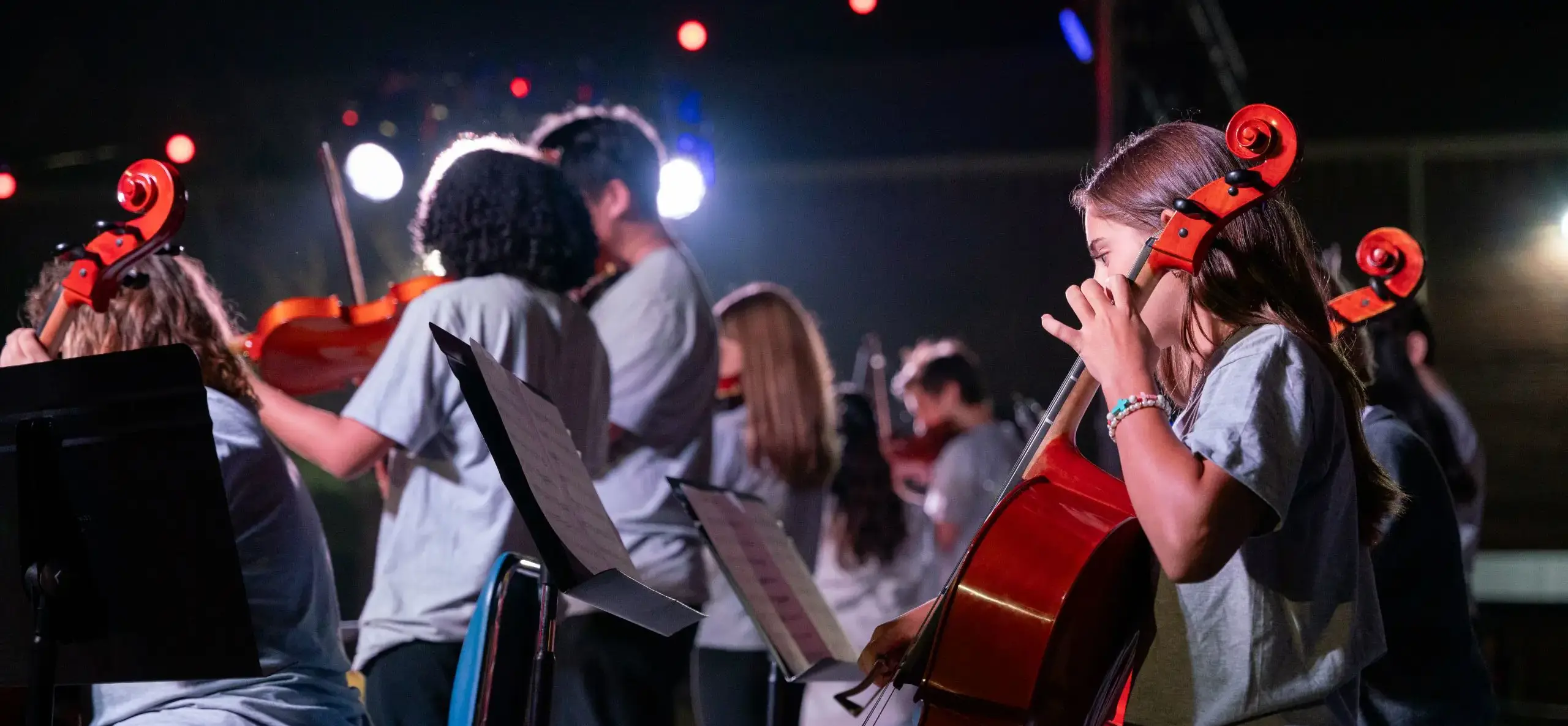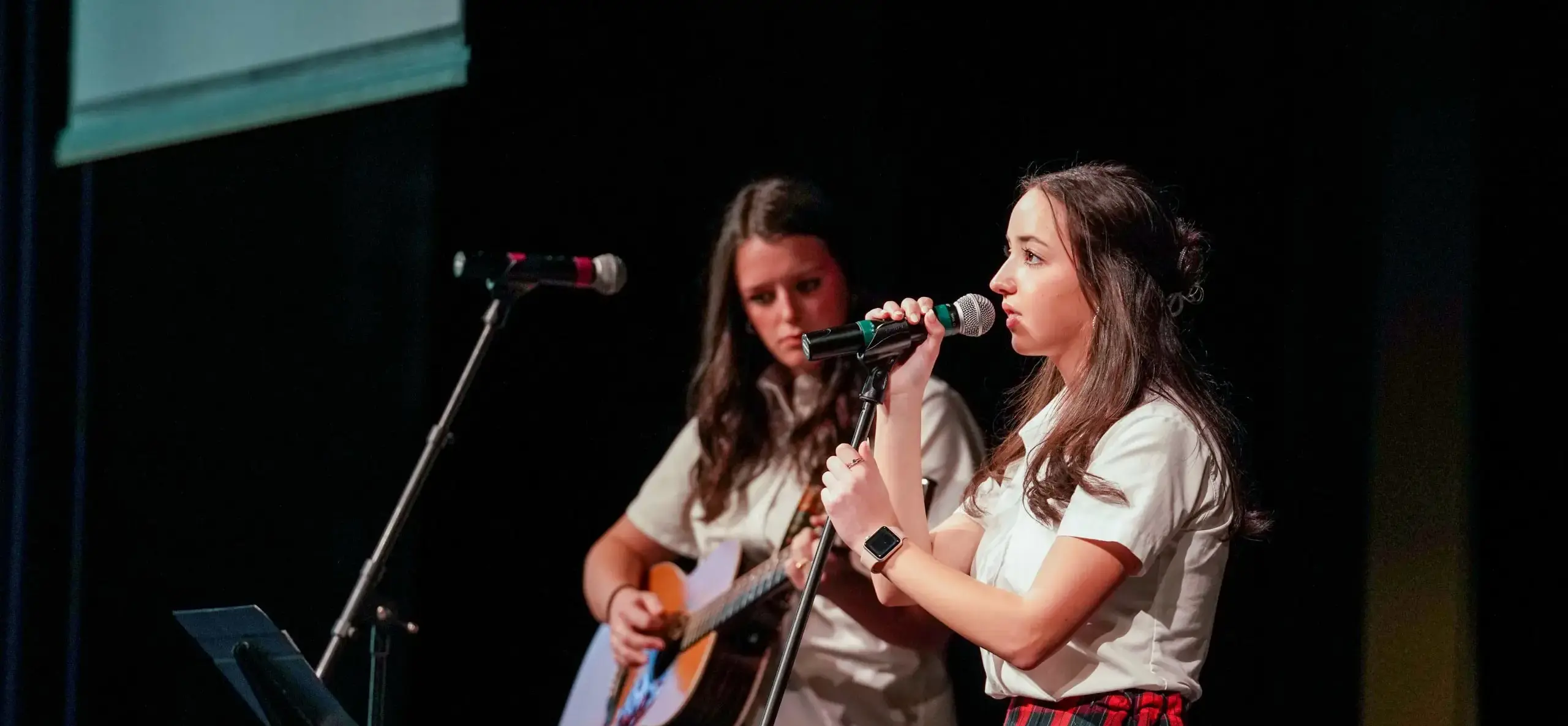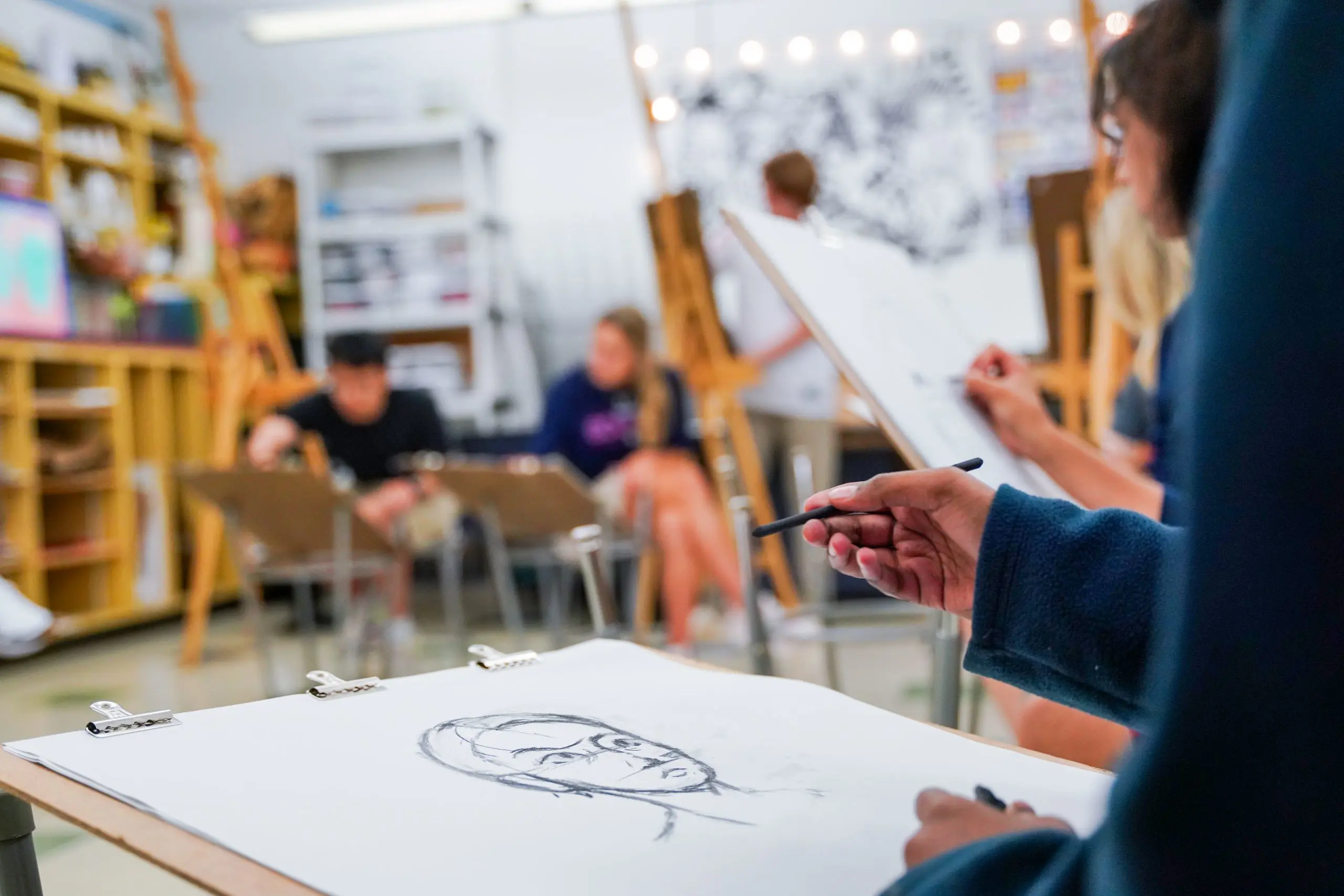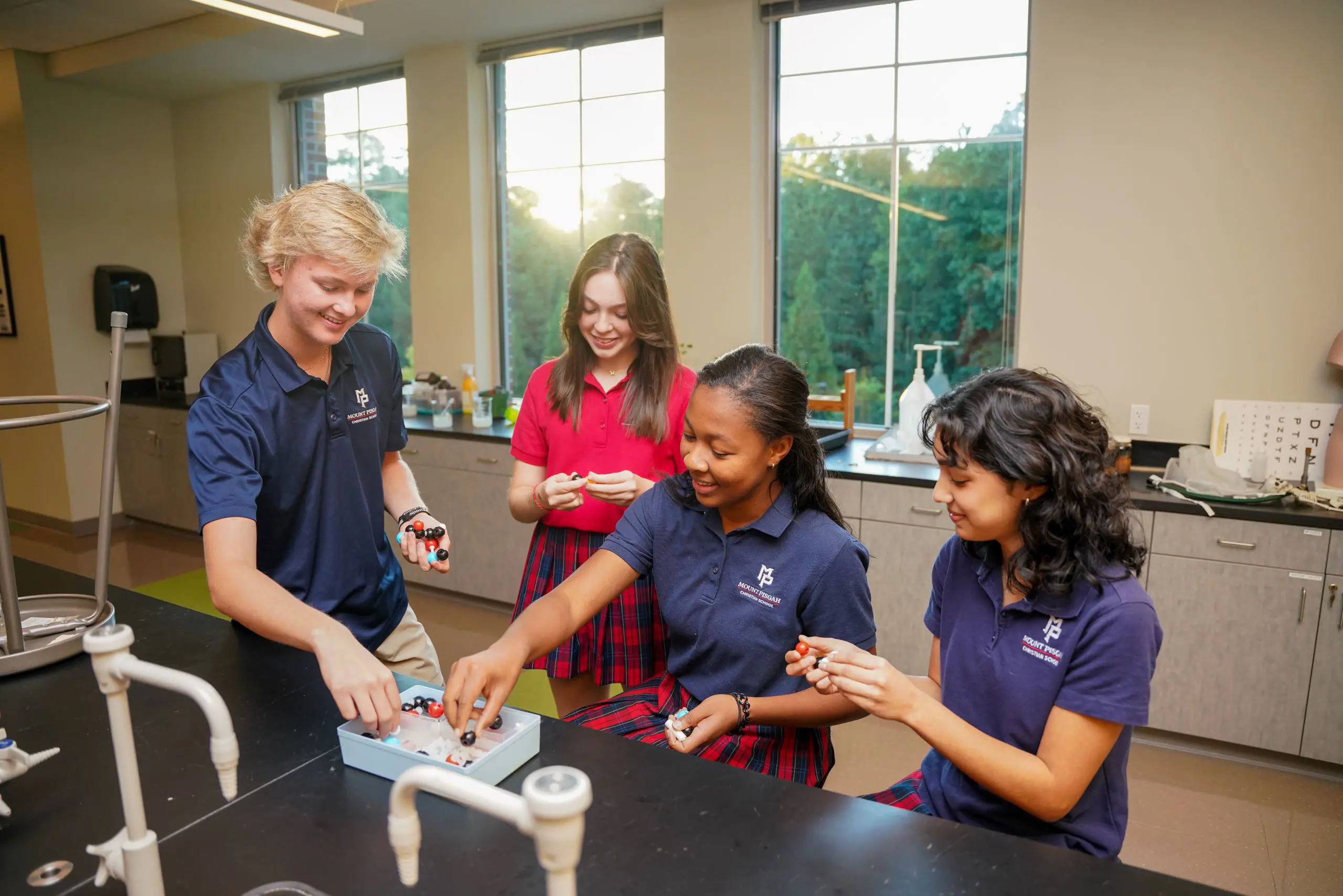Upper School students have the opportunity to explore courses beyond their core curriculum. Whether you are interested in photography, horticulture, or computer science, there are classes ready for you.
| PRINCIPALS OF LEADERSHIP AND COMMUNICATION |
|---|
|
Develop essential leadership and communication skills in this engaging semester-long course. Learn how to inspire and motivate others, build trust, and foster collaboration in group settings. Explore the fundamentals of public speaking, active listening, conflict resolution, and decision-making. Analyze real-world examples of effective leadership and apply these concepts through interactive activities and team projects. Gain insight into different leadership styles and how to adapt them to various situations. Whether leading a team or contributing as a member, this course will prepare you to communicate with confidence and lead with purpose. |
| AP BUSINESS WITH PERSONAL FINANCE |
|
AP Business with Personal Finance is a yearlong high school business and personal finance course that aligns closely with a college-level introduction to business course. Students explore the business disciplines of entrepreneurship, marketing, finance, accounting, and management through real-world business applications, case studies, and project based learning. In addition, students learn and apply all the National Standards for Personal Financial Education created by the Council for Economic Education and the Jump$tart Coalition for Personal Financial Literacy. |
| PERSONAL FINANCE |
| Master the skills to make informed financial decisions in this practical semester-long course. Learn how to budget, save, and manage money effectively to achieve personal goals. Explore key topics like banking, credit, investing, taxes, and insurance, with a focus on real-world applications. Understand the importance of financial planning and how to avoid common pitfalls like debt and fraud. Through interactive activities and projects, gain the tools to build financial independence and security. This course empowers students to take control of their financial future with confidence and responsibility. |
| GLOBAL BUSINESS CONNECTIONS AND WORLD EVENTS |
| Explore the dynamic intersection of global business and major world events in this semester-long course. Delve into the fundamentals of international business issues such as balance of trade, exchange rates, comparative advantage of imports and exports, and GDP. Additionally, study international geopolitical issues such as treaties, détente’, NATO alliances, and world order. This class will compare and contrast international leaders and the governments they run. The student will study and analyze how global events shape economic landscapes. From geopolitical shifts to technological advancements, examine case studies and real-time examples to understand their impact on international markets. Develop critical thinking skills through discussions on sustainability, ethics, and corporate responsibility in a global context. Gain practical insights into market trends, financial strategies, and global supply chains. Prepare for the future of business leadership with hands-on projects that simulate real-world scenarios and foster international geopolitical thinking. |
| ENTREPRENEURSHIP |
| Unleash your potential to create and lead in this semester-long introduction to entrepreneurship. Learn how to identify opportunities, develop business ideas, and turn them into viable ventures. Gain essential skills in market research, financial planning, and pitching your ideas. Explore real-world case studies of successful startups and analyze what makes them thrive. Through hands-on projects, collaborate with peers to design, refine, and present your business plans. Build confidence, resilience, and innovative thinking as you prepare to navigate the challenges of launching your own enterprise. |
| LAW |
| Explore the foundations of the legal system in this semester-long course designed for high school students. Learn about the structure of government, the role of courts, and the principles of criminal, civil, and constitutional law. Examine real-world cases to understand how laws are applied and interpreted. Develop critical thinking and analytical skills through debates, mock trials, and legal research. Discuss contemporary legal issues such as individual rights, justice, and ethics. This course offers a practical and engaging introduction to the legal profession and the impact of law on society. |
| PRINCIPALS OF LEADERSHIP AND COMMUNICATION |
| Develop essential leadership and communication skills in this engaging semester-long course. Learn how to inspire and motivate others, build trust, and foster collaboration in group settings. Explore the fundamentals of public speaking, active listening, conflict resolution, and decision-making. Analyze real-world examples of effective leadership and apply these concepts through interactive activities and team projects. Gain insight into different leadership styles and how to adapt them to various situations. Whether leading a team or contributing as a member, this course will prepare you to communicate with confidence and lead with purpose. |
| WEIGHT TRAINING |
|---|
|
This class teaches weight training techniques that facilitate the total development of the student (physically, mentally, and socially). This course aids the development of a positive self-concept through successful learning experiences and physical growth. |
| Science of Well-Being |
|
This course is loosely designed from the Yale University “Science of Happiness” course. The goal of this course is to provide students with tools to use during stressful periods of life. Students will perform some of the following stress reduction techniques: deep breathing, journaling, meditation, yoga, and art therapy. This is a semester-long elective. |
| JOURNALISM |
|---|
|
This semester course is designed to teach students the various types of journalistic writing styles. Incorporated in each class are examinations of journalistic ethics, layout, libel, trends, and responsibilities. Students will also have an opportunity to work with the Liberty Bell, Mount Pisgah’s school newspaper. |
| YEARBOOK |
|
This class will focus on the planning, creation, selling, financing, and distribution of Mount Pisgah's yearbook. The finished product will be completely student-generated. The fundamentals of yearbook journalism include coverage of the year’s events, ethics, writing story copy, writing captions, creating sidebars, and photojournalism. Yearbook design includes creating aesthetically pleasing layouts using enhancing graphics and effectively using color. Integral to yearbook journalism is developing and carrying out a theme, both verbally and visually, that suits the School. Work outside of normal classroom hours may be necessary for this class. |
| AP ART HISTORY |
| What is art and how is it made? Why and how does art change? How do we describe our thinking about art? In this course, students will contextualize and analyze European and global artworks, apply complex terminology to artworks, styles, and movements, and ultimately learn to communicate at a post-secondary level in expressing their analysis of these works. The course will spend the most time on Renaissance art to the 21st century. We will explore ancient through the Medieval ages, and global arts including Africa, the ancient North and South Americas, Asia, Near East, Oceania, and Islamic traditions. Students will learn from a College Board list of 250 artworks chronologically, beginning with Paleolithic painting/sculpture and ending with Post-Modernist contemporary artists. Students are required to take the College Board AP Art History examination in May. Year-Long Course, Required Summer Work. |
| AP EUROPEAN HISTORY (OFFERED PERIODICALLY) |
| This course is open to all qualified seniors. The AP European History course instills in students an appreciation and an understanding of the impact of European History on Western civilization and the world. To achieve this goal, students read, write, articulate, and think critically at a college level about vital issues in the European experience. Students master the complexity of the pivotal events, key personalities, great movements, and important developments in European history from the Renaissance through the present day. Students read, write, discuss and express themselves critically. Classroom activities include discussion, lecture, cooperative learning groups, essays, and the analysis of primary and secondary sources. Students are required to take the College Board AP European History examination in May. Year-Long Course, Required Summer Work. |
| AP PSYCHOLOGY |
| This is a College Board-approved, year-long elective course offered to qualified juniors and seniors. The AP Psychology course is taught at the college level and is designed to introduce students to the systematic and scientific study of the behavior and mental processes of human beings and other animals. Students are exposed to the psychological facts, principles, and phenomena associated with each of the major subfields within psychology. Students also learn about the ethics and methods psychologists use in their science and practice. Students cover material on their own. The AP curriculum stresses higher-order thinking skills within a rigorous academic context. Students analyze, synthesize and evaluate primary and secondary sources, in addition to memorizing, comprehending, and applying facts. Students are required to take the College Board AP Psychology examination in May. Year-Long Course, Required Summer Work. |
| PSYCHOLOGY |
| This is an elective, semester course open to juniors and seniors. Students are introduced to the various theories applied to the studies of human development, human relationships, mental and emotional disorders, dream analysis, and treatments in these fields. This course investigates the physiological state, the cognitive state, personality, learned behavior, fixations/phobias, and mental illness. Research and case studies play a major role in the course. Students engage in active learning, critical and creative thinking, and simulations to further their understanding of the subject matter. |
| Media Studies: Podcasting & Broadcasting |
| The Media Studies: Podcasting & Broadcasting course introduces students to the dynamic world of audio and visual media production. This hands-on, project-based course equips students with the technical, creative, and ethical skills required to produce compelling podcasts and broadcasts. Through the exploration of storytelling, scriptwriting, interviewing, technical production, and on-air performance, students will develop proficiency in all aspects of media production. Students will engage in collaborative projects, including the production of a multi-episode podcast series and a live broadcast. Emphasizing Christian values, students will reflect on how media can be a tool for truth, integrity, and positive influence. They will examine the role of media in shaping worldviews, learn to identify bias and misinformation, and explore how biblical principles such as honesty (Proverbs 12:22) and being "salt and light" (Matthew 5:13-16) apply to media production. |
| Adulting 101 |
| Adulting 101 is a semester-long elective course, available to 10th, 11th, and 12th-grade students, designed to equip students with essential tools for adulthood through hands-on, experiential learning. Focusing on practical skills, students take on real-life tasks, learn to manage responsibilities, and explore what it takes to thrive in the world beyond school. Through interactive projects, guest speakers, and field trips students will learn to prepare for job interviews, build effective relationships, and manage personal responsibilities. With a focus on practical know-how and hands-on projects, this class brings a fun, engaging approach to adulting essentials — empowering students to feel prepared and excited for their life after high school. |
| WORSHIP BAND |
|---|
| In this semester-long course, students learn how to grow and develop as worship leaders. The goal of the course is to equip students with wisdom from scripture on how to lead others and impact the greater student body of Mount Pisgah. Students will be responsible for helping develop and implement chapel programming, serving younger peers at Mount Pisgah, and synthesizing course content in a final capstone assessment. Student leaders will also be given the opportunity to partner with school administration in upcoming events and planning. This course will include visits from guest speakers and off-campus outings to learn about leadership. The course fulfills a Bible requirement for any grade level 10-12. Students with a heart to lead for the Lord are encouraged to apply. Class size is limited** |
| ADVANCED DIGITAL IMAGING |
|---|
| This advanced-level digital course will introduce students to the principles of design and explores basic graphic design techniques. Students will learn layout design and typography manipulation, as well as be introduced to Microsoft Publisher and Adobe Photoshop. Students will need a computer that can run Microsoft PowerPoint, Microsoft Publisher, and Adobe Photoshop. Prerequisite: Introduction to Digital Imaging. |
| ADVANCED STUDIO ART |
| Advanced Studio Art is an advanced-level drawing course with an emphasis on developing a greater understanding of art and the application of design principles in a variety of media. Studio experiences include drawing, painting, and mixed media projects. This course reinforces drawing and critical analysis skills for responding to master drawings of different historical styles and periods. Students will examine solutions to drawing problems through student drawings and those of other artists. Students will demonstrate their ability to respond, analyze, and interpret their artwork and the work of others through discussions, critiques, and artist statements. Creative problem-solving will be explored through art production and the study of master artists along with the continued development of personal artistic voice. (Prerequisite: Intro to Studio Art & Intermediate Studio Art) |
| AP ART & DESIGN |
| The AP Art and Design course is a year-long course designed to prepare and guide students through the art-making process of creating an AP Art and Design Portfolio. The framework presents an inquiry-based approach to learning about and making art and design. Students are expected to conduct an in-depth, sustained investigation of materials, processes, and ideas. The framework focuses on concepts and skills emphasized within college art and design foundations courses with the same intent: to help students become inquisitive, thoughtful artists and designers able to articulate information about their work. AP Art and Design students develop and apply skills of inquiry and investigation, practice, experimentation, revision, communication, and reflection. Students are required to take the AP Art & Design examination in May. (Prerequisite: Intro to Studio Art through Studio Art Portfolio), Year-Long Course - Required Summer Work |
| DIGITAL ART PORTFOLIO |
| This upper-level course is for students who wish to develop their digital art portfolios. Students will develop works for their portfolios using prompts to generate ideas. They are encouraged to take their work to the next level using digital media while applying their knowledge of the Principles of Design to each work. Students will utilize multiple software programs to aid their artistic development and will work independently to conduct research, develop sketches, and generate ideas for artwork using visual journaling to express their ideas. Students will need a computer able to run Microsoft PowerPoint, Microsoft Publisher, and Adobe Photoshop. Prerequisite: Introduction to Digital Imaging and Advanced Digital Imaging. |
| DIGITAL DESIGN FUSION: 3D ANIMATION AND ENGINEERING INNOVATIONS |
|
In this course, students will focus on 3D design elements through animation (illusion of movement in visual environments) and engineering. Students will mix multiple media types to explore advanced animation and create solutions to problems that are identified by students. After generating prototypes using software, students will use 3D printers to test ideas. They will also use programmable robots and stop-motion photography in this course. This course develops creativity, problem-solving, learning from failure, perseverance, and learning from feedback. |
| INDEPENDENT STUDIO ART PORTFOLIO |
|
This semester-long class is intended for students who have completed Art I - IV and are interested in further developing their art portfolio. Students will work with the instructor to develop personally meaningful artworks that synthesize materials, processes, and ideas. They will research artists to inspire their concepts and compositional development. Exploration of media and continued development of skills and techniques will be emphasized. Independent study students develop and apply skills of inquiry and investigation, practice, experimentation, revision, communication, and reflection. This course is intended to develop a college portfolio and serves as a pre- AP Art and Design course. (Prerequisite: Intro to Studio Art, Intermediate, Advanced Studio Art, and Studio Art Portfolio) |
| INTERMEDIATE STUDIO ART |
| Intermediate Studio Art is a semester-long intermediate drawing course designed to enhance basic drawing skills and techniques and provides further exploration of drawing media. Students will apply design principles to their work in a variety of media. Studio experiences include drawing, mixed media, and printmaking projects. Students will demonstrate their ability to respond, analyze, and interpret their artwork and the work of others through discussion, critiques, and self-reflection. Students develop creative problem-solving through art production and the development of a personal artistic voice. (Prerequisite: Intro to Studio Art) |
| INTRODUCTION TO DIGITAL LEARNING |
| This semester-long course will explore the history of American photography and introduces students to the principles of photography. Students will learn to edit images using Adobe Photoshop Lightroom. Students will need a computer able to run Adobe Photoshop. No pre-requisite is required. |
| INTRODUCTION TO STUDIO ART |
| Intro to Studio Art is a semester-long introductory-level course exploring foundational skills & creative thinking using various media and techniques including drawing, painting, mixed media, and sculptural techniques. This course introduces students to the language of art and while developing their skills, techniques, and creative problem-solving. Students will demonstrate their ability to analyze and interpret their artwork and the work of others through critique and self-reflection. This course provides a basic understanding and appreciation for the visual arts. |
| STUDIO ART PORTFOLIO |
| Studio Art Portfolio is an advanced-level drawing and painting course that explores painting techniques and offers opportunities to apply the techniques in a variety of media. The course will examine solutions to painting problems through the study of color theory and composition. Students will demonstrate their ability to respond to, analyze, and interpret their artwork and the work of others through discussion, critiques, and artist statements. Students will resolve complex painting problems and continue their development of concepts and personal styles. (Prerequisite: Intro to Studio Art, Intermediate, and Advanced Studio Art) |
| INTRO TO THEATRE ARTS |
|---|
| Students will gain a general knowledge of all aspects of theatre arts and discover ways that performance reflects and influences everyday life. Students will investigate and engage with solo performance, storytelling, monologue, and two-person scenes, as well as improv, stage combat, and theatre history. |
| ADVANCED THEATRE ARTS |
|
This course will give students the tools and skills required to create original dramatic work and theatrical performances from nothing. Students will investigate and engage with physical theatre, improvisation, text analysis, dramaturgy, stage design, and traditional character development. Additionally, students will learn voice and acting techniques, improvisation, character analysis, mask-making, and monologues, as well as theatre vocabulary, and theatre history. This course may be taken multiple times. |
| AP MUSIC THEORY |
| This is a college-level class that follows the given curriculum requirements of the College Board. Students will learn to read, write, arrange, and compose. The course will also include an intensive listening component for advanced ear training and sight singing development. Students are required to take the College Board AP Music Theory examination in May. This course is offered every other year. Year-Long Course, Required Summer Work |
| BAND |
| Upper School Band is a large ensemble that focuses on bringing the foundations of musical skills and knowledge together into comprehensive music education. Over four years, this class will go through a comprehensive study of music history, group performance, music theory, and composition. Students will work as an ensemble to make music together with a variety of instruments and perform 3-4 times a year. This course requires some nighttime performances. Recommended Year-Long Course |
| ORCHESTRA |
|
Students in the MPCS String Orchestra will expand their knowledge of the foundations of playing string instruments as they achieve a high level of mastery in reading, notating, and interpreting music. Over four years, this class will go through a comprehensive study of music history, group performance, music theory, and composition. This course requires some nighttime performances. Recommended Year-Long Course |
| INTRODUCTION TO GUITAR |
|
In Intro to Guitar, students will learn basic techniques of playing the guitar and music theory. Beginning with simple songs, students will play solo and in groups and may learn songs of their own choosing. This class is designed to provide students with a way to experience music with or without prior musical knowledge. |
| INTRODUCTION TO PIANO |
| In Intro to Piano, students will learn basic techniques of playing the piano and music theory. This class is designed to provide students with a way to experience music with or without prior musical knowledge. |
| AP COMPUTER SCIENCE A |
|---|
| AP Computer Science A is a college-level course that introduces students to computer science through programming. Fundamental topics in this course include the design of solutions to problems, the use of data structures to organize large sets of data, the development and implementation of algorithms to process data and discover new information, the analysis of potential solutions, and the ethical and social implications of computing systems. The course emphasizes object-oriented programming and design using the Java programming language. Students are required to take the AP exam in May. |
| AP COMPUTER SCIENCE PRINCIPLES |
| AP Computer Science Principles is an introductory college-level computing course that introduces students to the breadth of the field of computer science. Students learn to design and evaluate solutions and to apply computer science to solve problems through the development of algorithms and programs. They incorporate abstraction into programs and use data to discover new knowledge. Students also explain how computing innovations and computing systems—including the internet—work, explore their potential impacts, and contribute to a computing culture that is collaborative and ethical. Students are required to take the AP exam in May. |
| sports medicine |
| This course provides a general overview of athletic training, sports medicine, and its history. It includes introductory information about the athletic trainer's scope of practice: injury prevention, treatment, rehabilitation, emergency injury management, and administrative functions. This course is intended to help students gain an understanding of sports medicine, various associated disciplines, and the role they play in the physically active community. Students will learn basic information about the profession of athletic training and the roles and responsibilities of the athletic trainer as a healthcare provider. |
| horticulture |
| Horticulture is a branch of plant agriculture that covers the cultivation and maintenance of plants for food, medicine, and/or ornamental use. Throughout this course, students will review beneficial plant varieties and their stages of development; explore various horticulture techniques and best practices; and discover diverse uses of garden variety plants. “Learning by Doing” is a principal part of this class. Participants will have ample opportunities for hands-on learning experiences to develop newly acquired knowledge and skills. Students should come away from this course understanding the basics of food production and agricultural stewardship. |
| Digital Design Fusion: 3D Animation and Engineering Innovations, Animation Unit |
|
Animation is an illusion of movement in visual environments. Technology provides every person with the ability to create animations that are used in entertainment, presentations, social media campaigns, videos, and mobile experiences. Students learn animation basics through traditional cel animation and stop-motion photography. In 3D animation, students learn about its rapid advancement and influence throughout multiple industries. Using stop-motion animation and a programmable robot, budding animators mix multiple mediums to create their own choreographed dance moves. Engineering Unit: Using a variety of brainstorming techniques, students will identify a problem, empathize with someone affected by the problem, then prototype a solution. These solutions will be created using simple 3D-design software. Once the ideas are generated, students will use 3D printers to rapidly prototype and test their ideas. Creativity, problem-solving, failure, and feedback are all part of this project. |







